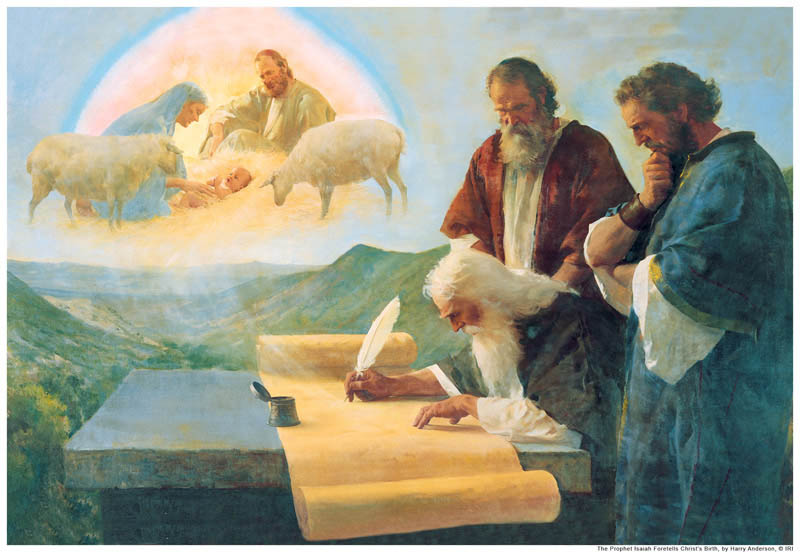 Isaiah presents perhaps the most important book of scripture in the Old Testament. Included are important prophecies of the coming of Jesus Christ, his ministry and nature. Prophecies of the last days and the regathering of Israel are also there. Jesus quoted Isaiah more often than any other Old Testament prophet. In addition, whole chapters are quoted and placed in the Book of Mormon, the choice of the ancient prophets who decided they must be included. This is remarkable, because parts of the Book of Mormon were sealed, not to be revealed until a much later time, and because the existing Book of Mormonwas abridged by Mormon, with certain scriptures left for later. Mormon chose to keep about one third of Isaiah’s writings. Nephi, a Book of Mormon prophet from around 600 B.C., said the following:
Isaiah presents perhaps the most important book of scripture in the Old Testament. Included are important prophecies of the coming of Jesus Christ, his ministry and nature. Prophecies of the last days and the regathering of Israel are also there. Jesus quoted Isaiah more often than any other Old Testament prophet. In addition, whole chapters are quoted and placed in the Book of Mormon, the choice of the ancient prophets who decided they must be included. This is remarkable, because parts of the Book of Mormon were sealed, not to be revealed until a much later time, and because the existing Book of Mormonwas abridged by Mormon, with certain scriptures left for later. Mormon chose to keep about one third of Isaiah’s writings. Nephi, a Book of Mormon prophet from around 600 B.C., said the following:
“Now I, Nephi, do speak somewhat concerning the words which I have written, which have been spoken by the mouth of Isaiah. For behold, Isaiah spake many things which were hard for many of my people to understand; for they know not concerning the manner of prophesying among the Jews.
“For I, Nephi, have not taught them many things concerning the manner of the Jews; for their works were works of darkness, and their doings were doings of abominations. Wherefore, I write unto my people, unto all those that shall receive hereafter these things which I write, that they may know the judgments of God, that they come upon all nations, according to the word which he hath spoken.
-
Isaiah was a poet who used poetic structure, imagery, and rhyme in his verses. These come through in Hebrew, and especially to those in the ancient culture who understood and appreciated the poetic form.
-
Isaiah was a poet who spoke in “future-present” tense. Thus, it is difficult to decipher whether he is speaking of past, present, or future events.
-
Isaiah was a poet who spoke of Christ the Messiah with Christ’s own voice, and then of the people observing Christ in their own voice.
-
Isaiah used imagery readily understood by the people in his own culture and time period. These allusions are foreign to us.
Jesus Christ visited the Nephite people after His resurrection. He taught them and organized His church just as he had done in the Holy Land. Christ said about Isaiah:
“Great are the words of Isaiah. For surely he spake as touching all things concerning my people which are of the house of Israel” ( 3 Nephi 23:1–2 ).
Latter-day Mormon revelation is contained in the Doctrine and Covenants.
“The Doctrine and Covenants makes approximately one hundred references to Isaiah’s writings by quoting, paraphrasing, or interpreting his teachings. The close connection between Isaiah’s words and those of the Doctrine and Covenants is apparent in Doctrine and Covenants 113 , which contains inspired interpretations of chapters 11 and 52 of Isaiah . The key to understanding Isaiah 65 is in Doctrine and Covenants 101 ; Doctrine and Covenants 133 opens up an understanding of Isaiah 35 , 51 , 63 , and 64 . Numerous examples of Isaiah’s phraseology can be found in the Doctrine and Covenants; compare Doctrine and Covenants 133:3, 15, 27, 40–53, 67–70 with Isaiah 52:10, 12 ; 51:10 ; 64:1–4 ; 63:1–9 ; 50:2–3, 11 .”
There are certain keys to understanding Isaiah.
-
Isaiah could be considered “advanced scripture.” The reader should be ready to invest extra effort in reading and studying his words. Isaiah taught a people who were ripening in iniquity. His words were meant for those who could hear with spiritual ears and see with spiritual eyes. As Christ taught in parables, Isaiah taught in poetry.
-
“The spirit of prophecy” is necessary to understand Isaiah’s words. The spirit of prophecy is a testimony of Jesus Christ conveyed through the Holy Ghost. The more a person comprehends Christ, His mission, His nature, the better the person will understand Isaiah.
-
A knowledge of the nature of prophesying among the ancient Jews is helpful. The elements included the following:
-
The Law of Moses — a law of repentance and restitution, plus patterns of worship to prepare the Israelites to receive Christ.
-
Imagery and figurative language — Isaiah used agriculture, the seasons, and ore refining in his imagery, among other vehicles.
-
Dualism and esoteric language — Babylon represents not only the empire, but the world and its carnal indulgences.
-
-
It is necessary to know something about Holy Land geography.
-
Learn of the judgments of God and how He has fulfilled prophecy over time.
-
Gain an understanding of the historical setting of Isaiah.
-
Read the Book of Mormon along with Isaiah, especially the first two books of Nephi and the Book of Jacob.
-
Try reading one verse and then jotting down a one-phrase summary. Then read the list of summaries.
*Parts of this article were adapted from the LDS Old Testament Institute Manual.
